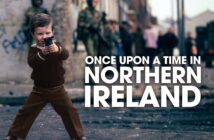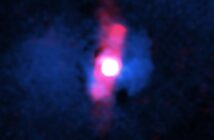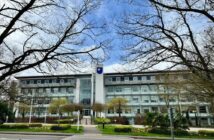Join Professor Brian Cox in a journey across time and space in a new series co-produced by the BBC and The Open University.
The first episode of Universe, a five-part documentary, airs on 27 October at 9.00pm on BBC2 and will begin by telling the story of the Sun, also known as ‘God Star’.
Airing weekly, later episodes will go on to explore Alien Worlds, The Milky Way, Black Holes and reach a stunning conclusion with The Big Bang, asking questions about the creation of our Universe and life itself.
Dr Ulrich Kolb, Senior Lecturer, School of Physical Sciences at the OU described the beauty and significance of a deep dive into our Universe and its secrets:
“Universe presents an exhilarating tour-de-force through the wonders of the cosmos, guided by our current understanding of how the myriads of galaxies, stars and planets formed and evolved. The pace of technological advances in telescopes, detectors and computers is such that new knowledge and revelations keep coming at breakneck speed.
“What emerges is an awe-inspiring, beautiful yet still very mysterious Universe, full of strange worlds and unimaginably powerful radiation. We inhabit a tiny, fragile corner in this vastness, and perhaps just now is the time to remind humankind of this, when we struggle to safeguard the wellbeing of our planet for future generations.”
The series takes a tour of stunning locations throughout the UK as the settings for its story, from the Isle of Sky to Snowdonia.
Dr Helen Fraser, Senior Lecturer, School of Physical Sciences, also highlighted the vastness of the documentary and the fascination in astronomy that it could inspire in viewers:
“Universe is an amazing journey from stars to planets, galaxies and black holes, spanning astronomy from the dawn of the cosmos to the last star dimming and dying. OU-BBC co-production programmes like this are a brilliant way to spark people’s interest in astronomy, and encourage them to learn more, especially when a TV programme can only scratch the surface of the amazing science.
Dr Fraser continued:
“The OU academics like me who were consultants on the series are all very active astronomers working at the forefront of research; our science, from exoplanets, to black holes and gravitational waves, star-formation and multiple star systems all features in the materials OU students’ study – and we even have our own robotic telescopes that are used for teaching and research.
I personally was involved with the first two episodes, sharing my expertise on how planets and stars form and the potential for life beyond our Solar System – The Universe presents this science with outstanding visual effects and music to accompany Brian’s scientific narrative. Astronomy at the OU is so vibrant and hands-on – even with distance learning – so I am certain that The Universe series will open doors for many individuals to start their learning journey with the OU”.
Dr Andrew Norton, Professor of Astrophysics Education, commented that those who were interested in Universe should consider finding out more through OU studies:
“This new series highlights some of the cutting-edge ideas in astronomy research that have developed over the last few years. If viewers are intrigued by these ideas and would like to find out more, I’d encourage anyone to sign up for an OU astronomy module to take it further.”
Dr Kolb echoed the hope that Universe would inspire a new cohort of keen astronomers and researchers into the field:
“My own astrophysics research is on stellar lifecycle and exoplanets, and I found the translation of the sometimes dry and highly mathematical concepts I am dealing with into the Universe’ episodes that are meant to mesmerize viewers while communicating factually correct science an exciting and formidable challenge.
Hopefully Universe can inspire the next generation of researchers to take an interest and help us progress further in understanding the world, and thus keep it safe.”
Gideon Bradshaw, Executive Producer, BBC Studios Science, discussed the production process in shaping Universe:
“Each episode was built upon some of the most recent discoveries in these fields, often featuring science that is yet to be settled. This was hugely exciting for the production team, to be able to present new research in what we hope will be an intriguing fresh take on the history of the Universe.
“But we simply couldn’t have done it without the support, guidance and wise advice of our team of academic advisors at the OU led by Stephen Serjeant. From the brainstorming at the beginning to the fact-checking at the end of production they were with us all the way as the Universe evolved and took shape, helping guide the film-makers through this epic adventure in time and space.”
Find out more
This series was commissioned by Broadcast and Partnerships and is supported by STEM.
The series is relevant to the following qualifications and modules:
Qualification Pathways:
- Q64 BSc (Honours) Natural Sciences
- Q77 BSc Mathematics and Physics
- F77 MSc in Space Science and Technology
- R51 Physics
- S10 Certificate in Astronomy and Planetary Science
Individual Modules:
- SM123 Physics and space
- S111 Questions in science
- SG077 Science: galaxies, stars and planets
- SXPS288 Remote experiments in Physics and Space
- S284 Astronomy
- S283 Planetary Science and the Search for Life
- S382 Astrophysics
- S383 The Relativistic Universe
Visit our NEW Broadcast & Partnerships site where you can find out more and order a free poster to accompany the series:
- Commissioned by Dr Caroline Ogilvie, Head of Broadcast and Partnerships
- Academic Consultants: Dr Judith Croston, Dr Hugh Dickinson, Dr Helen Fraser, Professor Carole Haswell, Dr Ulrich Kolb, Professor Andrew Norton, Professor Stephen Serjeant and Dr Sheona Urquhart
- Media Fellow: Dr Julia Cooke
- Broadcast Project Manager: Clair Robinson
- Broadcast Platforms and Public Engagement Managers: Andrew Hudson and Chris Belson


